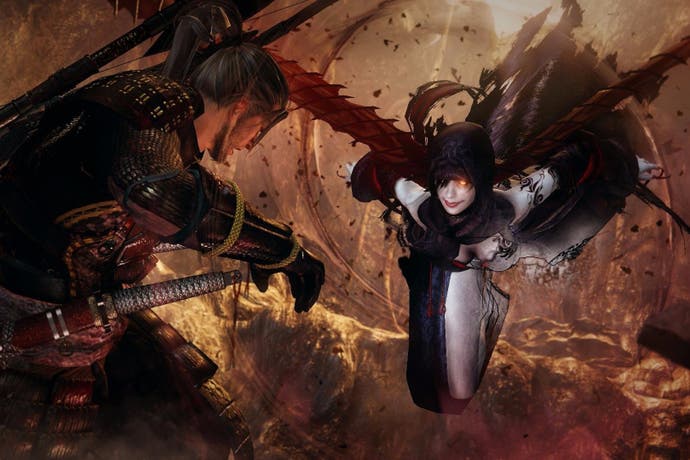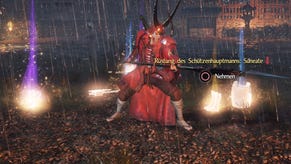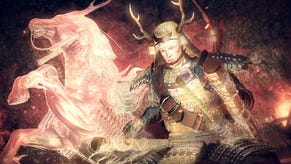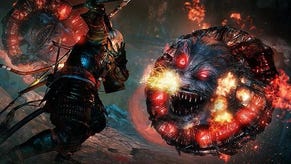Nioh is a Dark Souls imitator with soul
Way of the samurai.
Ever since From Software launched its cult classic action-RPGs Demon's Souls and its more popular multiplatform successor Dark Souls, developers far and wide have sought to replicate the runaway hit. The series' brilliant blend of foreboding dark fantasy, elliptical narrative techniques, and a best in class combat system have created what Eurogamer contributor Rich Stanton called "the greatest trilogy of modern times."
Perhaps Dark Souls' most influential effect was on how it's shaped the third-person action game. It used to be a genre defined by its spectacle. Everyone wanted their game to be bigger, bolder and bloodier with and endless array of shimmering particle effects and dazzling decapitations. Devil May Cry gave way to Ninja Gaiden gave way to God of War gave way to Bayonetta - arguably the flashiest and swiftest series in the wild west of this eastern genre.
From Software took a different approach. Rather than chase the glitz and glamour, it decided to take third-person combat in another direction. Rather than focus on speed, it rewarded players for meticulous nerve, for keeping their cool in relatively slow, lumbering battles where one wrong button press could spell instant doom. From Software may not have invented a stamina meter - a gauge that determines your ability to strike, dodge, block and run - but it perfected it to the point that it became a mainstay in how we now think of third-person action titles.
Given Dark Souls' success, there have been plenty of imitators over the years. Some have been very good. Others not so good. But it's hard to improve upon the best in the biz.
Team Ninja and Tecmo Koei, however, have done the next best thing: they created a Dark Souls clone that feels distinctly unique. Enter Nioh.
Nioh is an odd one. Team Ninja's ghostly game about a cursed samurai (who looks an awful lot like a certain Witcher you might know) is very much a Dark Souls clone. It uses the exact same respawn mechanic, wherein players have one chance to reclaim their lost exp from the spot they fell before it's gone for good. It has checkpoints where you can replenish your health and level up your character at the expense of respawning nearby foes. It has a stamina meter - something the folks at Team Ninja wouldn't have been caught dead applying to Ninja Gaiden's limb-severing swordsman Ryu Hyabusa.
Yet, based on its currently available beta, Team Ninja and co. have found their footing merging the studio's previous cathartic carnage with From's more measured methods. Many are quick to call Nioh "Ninja Gaiden meets Dark Souls" and they're not wrong, but it's more nuanced than that. By combining the two diametrically opposed styles of hack-and-slashing, you get something with a tempo very much its own.
Nioh protagonist William is fast. He dodges, sprints and strikes with the best of them. But he also runs out of breath very easily. More easily than even the lowest level Souls hero. And the punishment for running out of juice (called "ki" in Nioh parlance) is very grim indeed as it locks the poor fool in place for a couple of seconds while he helplessly pants. William goes from brutish super soldier one moment to an out of breath middle-aged jogger the next. This not only provides an extra layer of consequence to the already punishing combat system, it humanises our hero. It would be comical if it wasn't so tense.
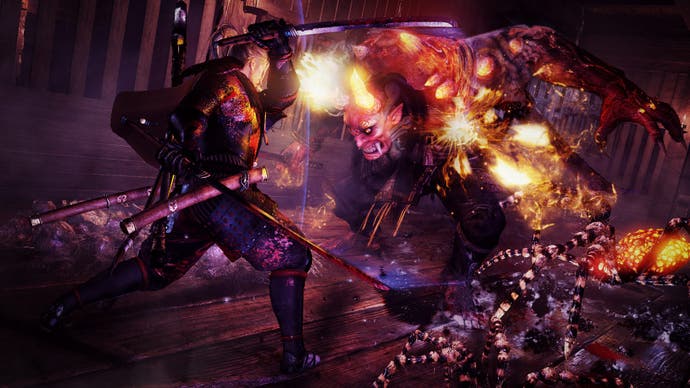
There's a staggering amount of depth to Nioh's fisticuffs. While William's weapons don't have the slick transitions of Bloodborne, each one can be held in three stances: high, medium and low. The higher you hold a weapon, the more powerful it hits at the expense of speed. A weapon held lower to the ground strikes swift, but soft. There's also light and heavy attacks attributed to each stance. Dole out a heavy attack while brandishing a hefty hammer in high stance and it will bring a staggering amount of pain as your armament comes crashing down, but it's slow and will drain almost your entire ki meter to pull off. The result is devastating; whether the fallout is at your expense or in your favour depends purely on your skill at timing, positioning, and pattern recognition.
There's a few neat tricks Nioh employs that are arguably an improvement on what we've seen in the Souls series. My favourite addition is the Revenant system, which allows players to summon hostile NPCs called Revenants that function as ghosts based on other fallen players. Before you summon each one there's a description of their level, giving a vague idea at what sort of challenge you're taking on. I generally left these alone - the game is plenty challenging enough without summoning extra enemies - but they provide a great pseudo PvP mode and the levels are so liberally littered with potential sparring partners that you can always mix up the monotony of grinding against the same preset foes.
Speaking of the regular enemies, their behaviour has changed in one major way since Nioh's alpha back in May. For better or worse, they no longer chase you to the ends of the earth. In the alpha, running past enemies was a recipe for disaster as you'd soon find yourself cornered by a dozen foes hot on your tail. This ensured that you couldn't "cheat" the game by dashing through its combat zones, but it arguably made the game a little too punishing and slowed down the pace immeasurably.
Now it functions more like Dark Souls where you can generally run past foes, but they'll still pursue you a decent amount before giving up. Some may argue that this neuters the challenge too much, but by the time you reach the boss of the cave level, you won't be complaining about Nioh's lack of difficulty. As a Souls veteran who found Dark Souls 3 and Bloodborne's base games a little lacking in cruelty, Nioh rekindled that sense of despair we all felt the first time we met Ornstein and Smough.
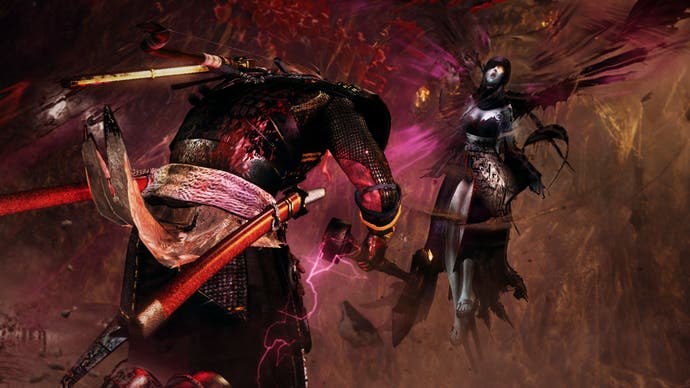
From what we've seen in the beta, Nioh's world and narrative lack the nuance of the Souls series' storytelling, but this doesn't matter that much in the moment. Thus far William is a dullard, making it a shame you can't create your own character, and 17th century Japan isn't as lavish as From's insanely detailed art direction. Yet there's still a quiet beauty in Nioh's more rickety environments. A haunted coastal village bathed in moonlight may not have much variety to its aesthetic, yet that arguably works in its favour as it grants the place a nightmarish sameness making it more challenging to navigate. If the Souls series' stages are a funhouse, Nioh's are a labyrinth.
While the similarities to the Souls series are endless, one interesting distinction is that Nioh offers a more old-school approach to its design by not being open-world. Missions are disconnected and selected from a menu with side-missions offering standalone combat challenges. The one I played was set in a field of tall, dried grass bathed in a golden sunset where demonic ninjas would scuffle through the scenery. Initially I was disappointed to discover this was nothing but an enclosed fighting arena, but what an arena! If you're going to lock me in a place and make me fight waves of foes, I can't think of a better backdrop.
While the beta only encompasses a fraction of what the full game will cover, Nioh is off to a very promising start. Deadly, moody, and immaculately well designed, Nioh is the rare Souls successor to really grasp what made From's series such a success while still imprinting its own unique stamp. Nioh has been in development for upwards of a decade and it's no doubt changed a lot in that time - indeed much of the alpha feedback has already been taken into consideration - and as long as the rest of the game can hold pace with what's been released so far, Nioh seems poised to be among the best in its class.
